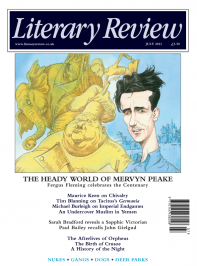William St Clair
William St Clair welcomes the publication of William Godwin’s Letters and Diary
The Letters of William Godwin, Volume 1: 1778–1797
By Pamela Clemit (ed)
Oxford University Press 306pp £100
William Godwin’s Diary: Reconstructing a Social and Political Culture 1788–1836
By David O’Shaughnessy, Mark Philp, Victoria Myers, James Cummings (eds)
Claire Clairmont, Mary Jane’s Daughter: New Correspondence with Claire’s Father
By Vicki Parslow
Without exception, it is fair to say, every one of William Godwin’s many books was intended not only to impart information but to engage the reader in a debate. Godwin also wrote many letters, often in answer to strangers, with the purpose of sharing experiences in what his age could regard unapologetically as an ongoing search for truth. As Godwin wrote to Shelley (one of the many readers of An Enquiry into Political Justice who had asked to meet him), the life of a thinking man ‘is a series of Retractations’. Since Godwin kept drafts of some letters as he was composing them and made copies of others before he sent them, and given that he and his family later retrieved many from the recipients, the corpus is extraordinarily full, with around 1,200 known to survive.
The Letters of William Godwin, Volume 1: 1778–1797, which contains nearly 200, is now out. There will eventually be five volumes plus a sixth, Selected Incoming Letters. Although the huge archive of Godwin and Shelley family manuscripts from which most of the letters have been drawn has been

Sign Up to our newsletter
Receive free articles, highlights from the archive, news, details of prizes, and much more.@Lit_Review
Follow Literary Review on Twitter
Twitter Feed
Princess Diana was adored and scorned, idolised, canonised and chastised.
Why, asks @NshShulman, was everyone mad about Diana?
Find out in the May issue of Literary Review, out now.
Literary Review - For People Who Devour Books
In the Current Issue: Nicola Shulman on Princess Diana * Sophie Oliver on Gertrude Stein * Costica Bradatan on P...
literaryreview.co.uk
Under its longest-serving editor, Graydon Carter, Vanity Fair was that rare thing – a New York society magazine that published serious journalism.
@PeterPeteryork looks at what Carter got right.
Peter York - Deluxe Editions
Peter York: Deluxe Editions - When the Going Was Good: An Editor’s Adventures During the Last Golden Age of Magazines by Graydon Carter
literaryreview.co.uk
Henry James returned to America in 1904 with three objectives: to see his brother William, to deliver a series of lectures on Balzac, and to gather material for a pair of books about modern America.
Peter Rose follows James out west.
Peter Rose - The Restless Analyst
Peter Rose: The Restless Analyst - Henry James Comes Home: Rediscovering America in the Gilded Age by Peter Brooks...
literaryreview.co.uk